Food preservation is one of the most essential topics for preppers to be familiar with.
In this article, we’re going to be looking specifically at historical methods for keeping eggs fresh. Eggs are a key part of most homesteaders diets, as they provide an easily available, protein-rich and filling food.
Hens tend to cease laying or lay significantly less during the winter, so understanding how to preserve eggs means that you can keep them in steady supply during the cold season. Knowing how to store eggs effectively without the use of modern refrigeration or electricity is an invaluable skill to have.
General Guidelines For All Methods
Don’t wash your eggs! When a hen lays her eggs, they arrive coated in a protective layer called a bloom. This bloom serves to protect the developing chick by preventing external bacteria from entering the egg. Washing chicken eggs will remove this protective bloom and allow bacteria to enter into the egg. For this reason, do not wash or wet the eggs before preserving them.
Pick only the best eggs. You are advised to choose only the freshest, cleanest eggs for preservation. If you have cracked or dirty eggs, eat these right away and don’t attempt to store them.
Test your eggs before eating. These traditional methods are not foolproof, and there is a chance that a small percentage of your eggs will go bad. Always do the float test before eating any eggs that you have preserved!
Simply submerge your eggs in a container filled with cold water. Eggs that sink to the bottom of the container are fine, but any that float have gone off and should be discarded.
Related: How To Make Calcium Supplements from Eggshells
The Top 6 Techniques:
#1. Preserving Eggs In Slaked Lime
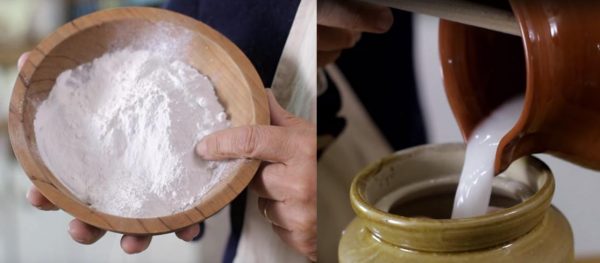 This is a typical method from the 18th century that is considered to be incredibly effective and was used right up until the introduction of electric refrigeration.
This is a typical method from the 18th century that is considered to be incredibly effective and was used right up until the introduction of electric refrigeration.
Lime was commonly used for building in previous centuries and is still in use today. Slaked lime can be purchased easily and cheaply at a building supply store. Make sure that you asked for hydrated lime, which is not the same as the type of lime that is used in gardens.
Carefully place your eggs in a water-tight container such as a ceramic pot or a keg, ideally one that has a lid. Now you need to make the lime solution. For a small to mid sized container, use one quart of tap water with one ounce of hydrated lime. For larger containers, use a similar ratio or water and lime. Mix the lime with water and mix until it is thoroughly dissolved.
Pour the hydrated lime liquid over the eggs and ensure that they are completely submerged in this lime solution. In order to prevent evaporation of the water, close the container with a lid. If you do not have a lid, some recipes suggest pouring a layer of oil in at the end instead. Place them in a cool location, and avoid moving the jar as much as possible so there is less chance of the eggs breaking.
Using this method your eggs will last up to 8 months.
#2. Burying Eggs In Wood Ash
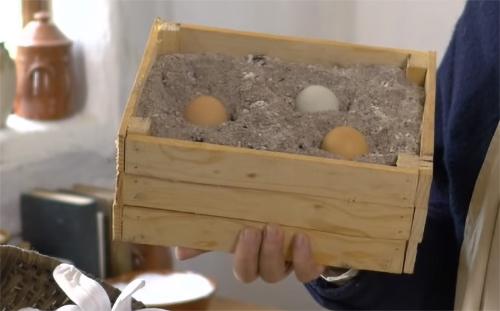 Wood ash was a freely available resource for pioneers and is known to have been used for preserving eggs. Use a large container such as a ceramic pot and pour in enough ash to make a thick layer on the bottom of the container. Add in your eggs, ensuring that they are not touching one another. Cover the eggs in at least one inch of wood ash. If there is more space in the container, make further layers or eggs and ash.
Wood ash was a freely available resource for pioneers and is known to have been used for preserving eggs. Use a large container such as a ceramic pot and pour in enough ash to make a thick layer on the bottom of the container. Add in your eggs, ensuring that they are not touching one another. Cover the eggs in at least one inch of wood ash. If there is more space in the container, make further layers or eggs and ash.
Place your container in a cool, dark corner where there is no chance that the eggs will freeze. Eggs preserved using this method tend to take on a slightly ashy taste.
With this method your eggs will be good for about 6 months.
Related: Never Throw Away Your Wood Ash! Do This Instead
#3. Coating Eggs With Oil Or Fat
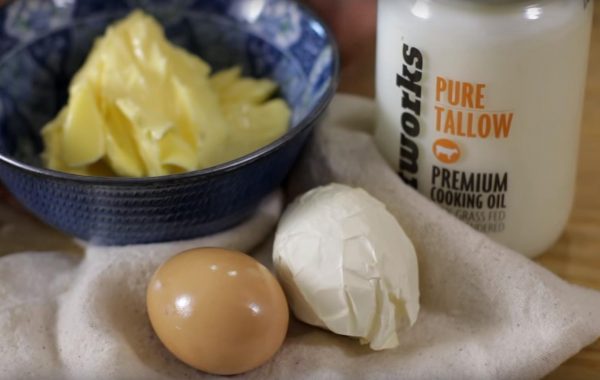 Coating an egg with a substance that makes its shell impermeable is another approach to preservation. Eggs can be immersed in food-grade mineral oil, or coated with lard or butter. Rendered suet is thought to be one of the best choices as it lasts a long time and will not go rancid like butter.
Coating an egg with a substance that makes its shell impermeable is another approach to preservation. Eggs can be immersed in food-grade mineral oil, or coated with lard or butter. Rendered suet is thought to be one of the best choices as it lasts a long time and will not go rancid like butter.
With this method your eggs will be good for about 4 months.
#4. Coating Eggs In Shellac Or Varnish
A variation on the above theme, coating eggs in shellac or varnish means that the shells are no longer porous. As the varnish will be sticky initially, rest the eggs on wax proof paper until they are entirely dry. They can be kept stored in a cool place, individually wrapped in paper. For a greater chance of success, coated eggs can also be stored in wood ash or one of the other preservation materials suggested below.
Using this method your eggs will last up to 4 months.
#5. Storing Eggs In Wheat Bran
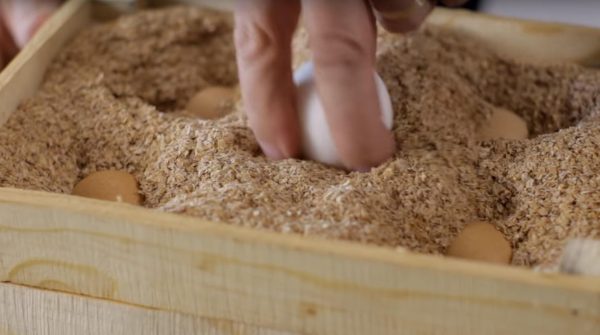 Wheat bran was readily available to many farmers and homesteaders in times gone by. Follow the same instructions as with the wood ash technique in no. 2 above. This technique imparts the musty smell and taste of wheat bran into the eggs.
Wheat bran was readily available to many farmers and homesteaders in times gone by. Follow the same instructions as with the wood ash technique in no. 2 above. This technique imparts the musty smell and taste of wheat bran into the eggs.
Using this method your eggs will be good up to 6 months.
#6. Keeping Eggs In Salt
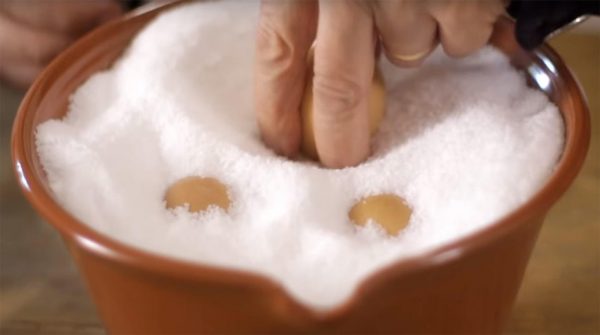
Salt is typically used in many different types of traditional food preservation, as it kills microbes and soaks up moisture. Follow the same instructions as with the wood ash technique in no. 2 above. Unsurprisingly, this method will impart a salty flavor to your eggs!
With this method your eggs will be good for about 4 months.
You may also like:
 How To Preserve Food With Duct Tape And Bentonite Clay
How To Preserve Food With Duct Tape And Bentonite Clay
Edibility Test: Find Out Which Backyard Weeds are Edible (Video)
What the Pioneers Stockpiled To Survive Winter





















Aren’t you contradicting yourself when you say to not get them wet, but then say to do a float test in water? It’s only older eggs that will float, so just make sure you pick eggs everyday. Also how come you don’t mention pickling boiled eggs? They are delicious.
I’m pretty sure he mentions that only when you wish to eat the eggs…to test them in water before you eat them. As far as “pick eggs everyday”, this is about preserving them.
Got it very clearly and understand the need for various methods. Nutrition information is identifying possible dietary limitations. Individuals can have different concerned stables. I’m allergic to sulfur & have an iron deficiency. That was identified at the age of 3years siblings. Very welcomed knowledges always contributed correspondence….Thankful.
That was exactly my thought.
Eggs are immersed, not washed. How many scrambled eggs do you get out of a dozen pickled eggs? These methods are for cooking eggs. But, yo, we like them pickled with red beets and some onion. Best egg salad ever. Great for deviled eggs, too. niio
@Range Rider you use the water test before you cook or use the egg. Not when you are storing you egg. So after you have stored you egg for months you might want to check and make sure the egg is still good before you use it.
Surprised that water-glass (sodium silicate) was not mentioned as a presrvation method.
Owen,
You beat me to this one. I’ve used it and it is a time honored method.
How long will eggs remain edible under each of these methods?
Glad to see this question asked, but sorry there are no replies. Therefore, I’ll ask it again.
Mike & Doug,
There is no good answer, since it depends on the condition of the eggs, how well they were processed when preserving, and the storage conditions including temperature.
We’ve kept them from weeks to months; but, they often don’t last more than a few weeks. All you can do is use the float test before you crack them open to eat.
When I was stationed in Germany the stores there always had their eggs at room temperature. They taught me eggs can be okay up to six weeks at room temperature as long as they are not washed and are clean. Once washed they must be refrigerated, because as this article states, the protective coating is no longer present.
Since the goal is to get eggs to be viable over winter without refrigeration, my guess would be 3-4 months…but hey, let’s try it! As soon as my hens start laying again I’ll put it to the test.
My Mom talked of this method that my Grandma used years ago. 30 gallon crocks a layer of salt eggs and a layer of salt till it was full stored in celler and they had fresh eggs all winter for cooking and baking, eggs must not touch each other according to Mom .
Unless one has access to chickens, the eggs one purchases in a grocery store, especially in the PDRK where nothing natural must come in contact with food, are scrubbed clean. I am surprised that our nanny overseers in Sacramento do not require the eggs to be dipped in boiling water before they could be sold. I am confident that if they knew where eggs were laid and how they were laid they would require that procedure first. As it is, eggs sold in the PDRK must be “free range” whatever that term means. I haven’t bothered to read the statute. We can’t have unhappy chickens in never-never land.
PDRK??
Peoples Democrat Republic of Kalifornia…. I think
Peepuls Republik of Kallyforniya. Where there is only one party rule, the socialist party.
HAW HAW HAW HAW! PDRK!!! I’m assuming People’s Demokratik Republik of Kalifornia! SO SO SO funny! I hadn’t heard that before, but it is totally a keeper. Well, for us! I feel for ya, LCC! I thought Florida was bad, until the people in K started acting up! They are just insane, and go hand in glove with many of our agencies (FDA, SEC, EPA, FEMA, DHS, etc etc etc. Thanks for the laugh LCC!
Free range chickens are kept in a large building. Not in cages. I really don’t see much difference. Thousands of chickens running around are warehouse, sorry to disappoint.
Pro: Massive difference, if done right. Most caged chickens lose toes, developing abscesses and even gangrene or die from stress.
Deep bedding in birds and pigs allowed to use a lot of space means low stress for them, lots of exercise, soil microbes as the bedding breaks down and gets moist underneath. If you add sprouts, grain sprouted and let grow into grass or forbs, then you put them close to the top of the ladder. Other results, no ear mites, no lice or fleas, no dying from overheating, no cannibalism, rat control is much easier, and no predators–but for us, of course. Feeding sprouts is growing common because they’re easy and double in feed value of straight grain, do not overheat an animal or cause liver lesions. Feed lots like sprouts for that, a lot fewer deaths from over eating. LDL is reduced to near nothing and Omega 3s greatly enhanced. 3rd world nations are leading us in a lot of this because they don’t have good, arable land like we do. All in all, that warehouse is as close to natural as most will ever see. niio
Red,
Also don’t forget to feed what many think of as common weeds when in season. Our hens love dandelion flowers and clover and even some grass clippings when they are fresh.
No predators except for raccoons in our case; bit, they have been handled individually and finally.
Sprouts are also beneficial as human food, since they contain nutrients not found in unsprouted grains such as B vitamins, vitamin C, folate,fiber, and essential amino acids such as lysine.
Yes! Sprouts are popular in 3rd world countries and in the US, as well. they beat feeding grain by a mile. ‘Round here, when you talk such things, people want to know what kind of hops you favor. 🙂 Even after being brewed, the sprouts make good feed for animals or people.
No raccoons. too dry and hot for them. We have better, coatimundi, which look like a cross between a raccoon and a weasel. They’re a major predator of birds but usually stay clear of the poultry except to hunt mice.
If coyotes, bobcats, hawks and eagles stuck to rodents, all would be well. Someone scared a mountain lion from their hen house last winter. A few years ago, down towards Sonoita, a rancher lost a few turkeys to a jaguar. One shotgun blast in the air and it never came back. No one will harm one, but no one tells Fish and Game, either. They tried to trap a couple of them to study and the cats died. Ranchers like them. Jags chase off mountain lions, coyotes, and harass grizzly bears.While they will take cattle and horses, that’s very rare and almost exclusive to Mexico with flabby European breeds of cattle the government demands ranchers raise. I saw one when working in Mexico. Vaqueros said to not talk of it because balam (jaguar) comes to protect. God knows, all the coyotes found dead after that are proof 🙂 niio
Free rang chickens are kept in a SMALL hut that is for their protection at night, during the day they roam freely in the fields and catch insects but they are never restricted to being cooped up, thats where the term, FREE RANGE CHICKEN comes from
Dave,
Actually they are cooped up and that’s why the small hut is called a Chicken Coop. In our case the coop is 12×16 feet, with plenty of room inside and both nest boxes and a roost. The coop is inside a fenced paddock area of about 20×35 feet, that lets the girl’s free range; but, protects them from predators and getting out onto the road. Within the paddock they have access to bugs, worms, and greens.
I have friends who do real free range and are constantly losing birds to predators.
Ohio: No, with mobile coops, it’s still considered free-range. Salatin in Virginia made that popular. There’s a major commercial chicken farm in NM that houses 50 birds per covered pen and they get moved constantly around a pasture. niio
I have used Crisco to coat the eggs. I put the coated eggs back in the egg containers. I then put the egg containers in plastic storage bin and store in a cool place. I rotate. I have used eggs that were a year old and they were fine. At 18 months, using the water-float test, they were iffy.
If all sources fail and you want to do the bran, try a tracker (race horse owner). They usually feed a lot of bran during the season. I never liked preserved in wood ashes, or eating eggs preserved in horse manure (Asian, heard this is a movie years back: “I’d like to order a dozen 1,000 year old eggs! and make sure they’re fresh! 🙂 niio
It says that storing the eggs in salt will give them a salty flavor. Wouldn’t storing them in shellac or varnish also alter their taste? Would they even be safe to eat?
What is PDRK eh? You guys can make rap up!
Left Coast Chuck is classed Deplorable in the PDRK but we love him nere!
That’s the nicest thing I am called.
See response above.
I find the title a bit interesting and redundant.
’The Top 6 Historical Egg Preservation Techniques For Eggs”
Since:
”The Top 6 Historical Egg Preservation Techniques works without the redundancy.
This is sound advice; but, usually not all that workable when you have your own chickens that lay eggs everywhere with most being covered with scat.
Our eggs are always fresh and undamaged; but, never clean, since our girls refuse to use the nesting boxes and lay them everywhere, so they are almost always covered in flecks of scat.
I see this in many articles; but, rarely do I see the reason for the difference.
When an egg spoils, internal bacteria that cause the spoilage produce gas as part of the process, making the eggs buoyant so they float.
You can also use paraffin or beeswax
Another way we keep them is to crack and dump into the sections of an ice cube tray, gently scramble them with a fork and freeze them. You can then just dump out the egg cubes, thaw them and use like normal.
Using this method in the historical context, could be done in winter as you harvest the eggs. Our production goes down a bit; but, our hens do lay all winter.
ate the last of our limed eggs this month – they were 11 months old – we put them in lime solution in january – were still very tasty but yokes would not stay together – still good for scrambled eggs and baking
Isn’t the egg already half spoiled by the time the yokes won’t stay together. I always thought they were gross at that stage.
Another new fangled method is dehydrating. As My girls are way down on eggs (AZ heat) none for saving. Crack & stir four eggs. Lay in a dehydrator’s rollup trays, dehydrate on low. Think the time is 4-6 hrs (need to check my recipe) Can either break up or actually grind to a fine powder. Usable in scrambled or backing. rehydrate ratio is 1:1.
Lisa-
If the eggs are ground to a powder what do you keep them in? In the ratio 1.1 is that like one cup of powder to one cup of water?
Dehydrated eggs.. Put in a ball canning jar. Will be adding an oxygen absorber. Learned this in my new recipe for “squash flour” 1:1 is 1 tbsp each water and powder. That equals a full egg. Let it soften, then whip it up. Makes omelets. When using it in baking, put the dry in with the dry and the water in with the liquid.
Hey! Cite your sources! These screen shots, methods, and research were taken from a Townsands video titled “The top 6 historical egg preservation techniques!”
Here’s the link to the video: https://www.youtube.com/watch?v=yUYgguMz1qI
No Michelle, got mine from an off grider book. That lady uses my method to feed her family every winter.
What do you do with the mixture( lime and water) once done with it? Any other uses you know aside from its ph neutralizing property to the soil? TIA